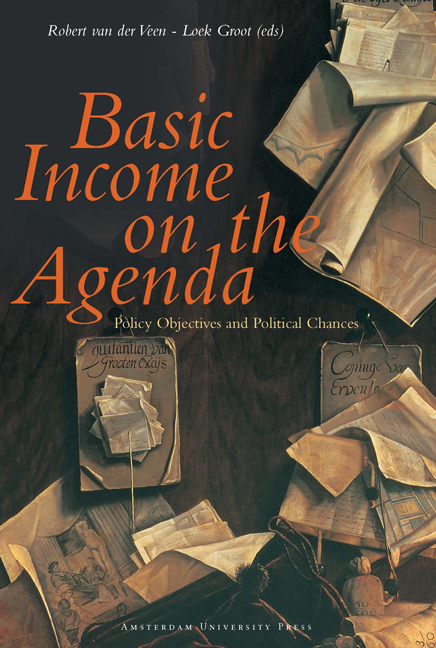How Attractive is a Basic Income for European Welfare States?
Published online by Cambridge University Press: 23 January 2021
Summary
A basic income is an income granted unconditionally to all on an individual basis, without a means test or work requirement. It is a type of minimum income guarantee that differs from those that now exist in various European countries. Considered in its pure form, a basic income is paid (1) to individuals rather than households; (2) irrespective of wealth or any income from other sources; and (3) without requiring the performance of any work or the willingness to accept a job if offered. Its relevance to the problems of contemporary welfare states has long been recognized. From the 1970s onwards, forms of basic income have been regularly proposed for adapting the post-war institutions of social transfer to the conditions of a modern economy, in which lifetime security through earned income is no longer the norm. The guiding claim was that an unconditional floor of guaranteed income is justified as the fairest and the most efficient way of reconstructing basic security in the welfare state. Inevitably, the fairness part of this claim led to a principled debate concerning the unconditional features of basic income, in particular the absence of the requirement of willingness to work. The reason for this is obvious, for any moral justification of unconditional basic income has to deal with the objection that it is unfair to hand out transfers to ablebodied persons who are merely unwilling to earn a living. This theme has been explored in depth in Arguing for Basic Income (1992).
However, basic income is being increasingly discussed in a more pragmatic context. This discussion is mostly concerned with the efficiency part of the above claim. Here, basic income is proposed as the most viable way of reconciling two of the welfare state's central objectives – the alleviation of poverty and full employment – while at the same time allowing scope for making the labour market function in a more flexible and dynamic way. One of the reasons why basic income has attracted interest is that it seeks to reinterpret the compatibility of these two central objectives, reflecting the fact that social policy and economic policy can no longer be conceived separately.
- Type
- Chapter
- Information
- Basic Income on the AgendaPolicy Objectives and Political Chances, pp. 13 - 38Publisher: Amsterdam University PressPrint publication year: 2000
- 3
- Cited by



